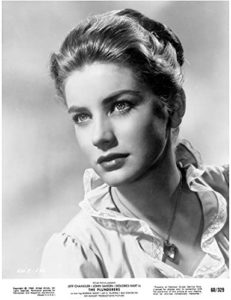Interview: “The Nun Who Kissed Elvis” — Actress Turned Nun R.M. Delores Hart O.S.B.
Posted on June 8, 2013 at 4:35 pm

How could I throw away a promising acting career for the monastic life of a cloistered nun?
I left the world I knew in order to reenter it on a more profound level. Many people don’t understand the difference between a vocation and your own idea about something. A vocation is a call—one you don’t necessarily want. The only thing I ever wanted to be was an actress. But I was called by God.
Mother Prioress Dolores Hart in the Preface to The Ear of the Heart
Delores Hart was one of the most successful young actresses of the early 1960’s. She starred in ten movies, with directors like George Cukor and Michael Curtiz, co-starring with George Hamilton, Montgomery Clift, and Elvis Presley. She appeared on Broadway and starred in the classic “Where the Boys Are.” And then she walked away from Hollywood and her fiancé to become a nun, joining the Abbey of Regina Laudis in Connecticut, a community of contemplative Benedictine women dedicated to the praise of God through prayer and work. The nuns of the abbey chant the Mass and full Divine office each day, while expressing the traditional Benedictine commitment to manual work and scholarship through various contemporary media and professional disciplines. The mission to praise God at all times is symbolized by the lyre on the abbey’s crest and by our motto, taken from the book of Judith – Non recedat laus: “Let praise never cease!”
Last year, a documentary about her called “God is the Bigger Elvis” was nominated for an Oscar. Now she has written a book about her life called The Ear of the Heart. It was a great honor to speak with her about her life and her book, and I was deeply touched by her open-hearted generosity of spirit. She speaks quietly, but she still has that lovely voice that was so captivating in her films.
She talked about how being in one place, with the same routine and the same people, can expand the spirit. “You have to start with how one perceives the world, reality. You can be in the same place, a place that is given for hospitality, for prayer, for finding God. Change comes because there is a mentality of looking for something different that will interest them, that will be more real — a new bauble, a new place to eat. But in a monastery, the continuity is such a blessing. You are going to the same place every day, sitting with the same people. The changes are the inner light of a person’s experience. The inner grasp of what life means. Every day you meet a new dimension — it may be the same person but you meet a new aspect of them.”
She quoted St. Teresa, who said that “prayer is the light of love between persons. God is love. Therefore, wherever you find God, you find the human experience of God. That’s why I carry my camera,” she said. She wanted to bring back to the convent the place and people she saw on her travels. She laughed when I asked her if nuns were funny. “A sense of humor is the top-notch gift for nuns. They always have a new take on something. You don’t have to be ugly or mean or dirty to have a funny sense of humor. The capacity to see the elements of humor in life itself. Finding the humor in life itself is what is funny.”
She spoke very warmly of Elvis. “I was 18 and he was 20 when we first worked together in “King Creole,” she said. He had so many fans that they had to say inside the hotel. He would take out the Gideon Bible and ask her what she thought about different passages. After she decided to become a nun he called to tell her he supported her choice and he continued to send greetings to her through a mutual friend who wrote to her regularly. “I did not have an in-depth relationship with him. We were too young. He wanted to be a really good actor. He wanted to be like James Dean. But Colonel Parker wanted the moola.” I told her of my fondness for the movie “Come to the Stable,” with Loretta Young and Celeste Holm as nuns. She told me that movie is inspired by the true story behind her order, and that Celeste Holm came to speak at the convent not long before she died.
She studied with two of the greatest acting teachers of the 20th century, Sanford Meisner and Uta Hagen. Their advice, to find the truth and be true to yourself, was important for acting and for life.
She was surprised and happy that people still know her films. “It was like I was moving completely out of any relationship with the movies,” she said. She never anticipated the technology — or the interest. “The experience of living in a monastic community allows you to see that every single moment is all you’ve got.”
